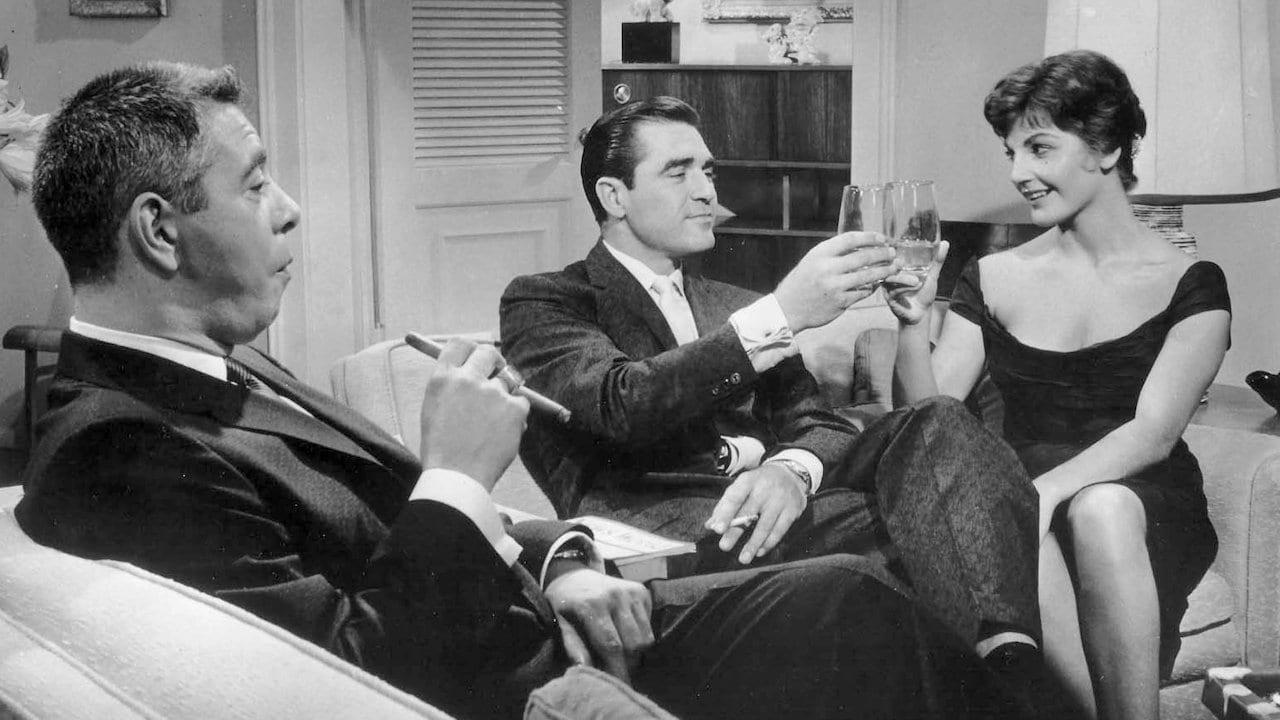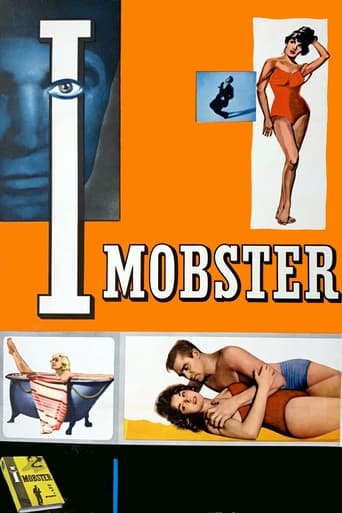

Some things I liked some I did not.
... View MoreAt first rather annoying in its heavy emphasis on reenactments, this movie ultimately proves fascinating, simply because the complicated, highly dramatic tale it tells still almost defies belief.
... View MoreA film of deceptively outspoken contemporary relevance, this is cinema at its most alert, alarming and alive.
... View MoreA great movie, one of the best of this year. There was a bit of confusion at one point in the plot, but nothing serious.
... View MoreAlthough shot on about 50 cents as a lot of Roger Corman projects were back in the day, Roger Corman if not gold, may have struck a bit of mineable copper with I, Mobster. Steve Cochran who played many a hood most effectively, is more than just effective, he's positively outstanding as a gangster who rises to the top of his profession from the slums. Cochran has two women in his life, one is his mother who too late realizes what she raised. She's beautifully played by Celia Lovsky. The second is Lita Milan who loves him despite the fact that Cochran kills her brother. To be sure by the way a brother played by John Brinkley who was hardly a noble character.The film is about 90% in flashback, as it opens we see Cochran before Senator Robert Shayne's subcommittee on Labor Racketeering repeating his 5th amendment right to deny his answers on the grounds of self incrimination. But as the camera focuses on Cochran doing that, Cochran in his mind narrates his life story for the committee. He tells of his rise from doing errands for the local boss, to becoming the local boss.Back in 1959 the McClellan Committee on Labor Racketeering was in full sway so Corman knew the film would have a timely impact. My only question was why didn't Shayne use a southern accent the way McClellan and earlier Estes Kefauver spoke?Cochran is mesmerizing and charismatic. He has to be for Lita Milan to fall for him. Then again Steve Cochran's bad boys on the big screen always were.He's the main reason and a good reason to check out I, Mobster.
... View MoreI Mobster is directed by Roger Corman and adapted to screenplay by Steve Fisher from the novel written by Joseph Hilton Smyth. It stars Steve Cochran, Lita Milan, Robert Strauss, Celia Lovsky and John Brinkley. A CinemaScope production, music is by Gerald Fried and Edward L. Alperson Junior and cinematography by Floyd Crosby. Roger Corman was late in coming to the film noir/crime splinter of film making, but in 1958 he manufactured two very accomplished gangster pictures. Machine Gun Kelly starring Charles Bronson was something of a success, so it was hardly surprising to see Corman serve up another helping of gangster cinema with I Mobster. Pic charts the rise of Joe Sante (Cochran), from a boy running bets for a local hood, to being the leader of all illegal and violent operations in the city. There's nothing remotely new here as per the genre scheme of things, it is what it is, a straight forward tale of a bad man who finds himself getting deeper in the mire the higher up the hoodlum ladder he gets. On the side of this normal trajectory is how his climb affects those closest to him, notably the two ladies of his life, Ma Sante and Teresa Porter. Come the resolution of the tale, Joe Sante is hit with the stark realisation of the life he has led. But is it too late for him? Along the way there's some sexy sizzle by way of a show put on by burlesque queen Lili St. Cyr, while Corman even inserts a sex metaphor that's so unsubtle that Hitchcock himself would doubtless have approved. Corman re-teams from "Kelly" with Crosby and Fried, who once again provide crisp black and white images and furious jazz strains respectively. He is well served by his cast, Cochran is too old for the role as written, but he has a magnetic presence. Milan impacts strongly as the one time honest girl turned moll in the name of love, while Lovsky as Joe's weary mother is hugely effective in conveying a parent with a broken heart. Best of the bunch is Strauss as Black Frankie, he's a larger than life henchman and with the writers affording the character some telling passages in the play, Strauss responds in kind. Recommended fare for genre fans after a quick fix of gangster shenanigans. 7/10
... View MoreRoger Corman directed this 1958 story of the rise and fall of a hoodlum, on what was for him a generous budget. There's an exploitation feeling to this one, which was one of many inexpensive, somewhat backward looking crime films of the late fifties. Steve Cochran, in the title role, is a little too old but still holds the screen with his unique brand of sleazy charisma, showing once again that with the right vehicle he might have become a major star. His performance is sympathetic, and helps make the movie more interesting than it might have been with a cooler actor (Ralph Meeker, say). The script isn't much, and the other actors are no more than adequate. If one has a taste for lowbrow crime films, this one's pretty good, as it evokes its paperback and men's magazine era nicely, and has about it the whiff of an old-time barbershop.
... View MoreThis film is classified as Film Noir, but on close examination is a routine 50s gangster movie and a cheap one at that. Joey Sante is a wiseacre, rebellious kid of 11 who runs numbers for the local bookies. Joey's father disapproves of his disrespect and arrogance but his mother convinces him he will someday be a great man. Suddenly the scene changes and while the other characters age slightly (if at all), adolescent Joey is now 41 year old Steve Cochran playing a younger age. The rest of the film focuses on Joe Sante's organized crime career, rising through the ranks to eventually running his own organization. But after breaking with the big boss Paul Moran (Grant Withers in his final role), he suddenly becomes the object of a Senate probe and marks himself for extinction.Sante's constant companion is Blackie (the affable Robert Strauss whose aging is suggested by hair frosting), first Joe's mentor while a boy, then his immediate superior, then his immediate subordinate and finally his trusted friend who does him in. Strauss had his chance to shore up if not carry the film, but his lackluster role got in the way due in great measure to uninspired direction.The film assumes an air of self-importance, epic and biographical in concept and presented in Cinemascope, but never rises above a low grade "B" picture in any aspect. While it pretends to be a fascinating study of a hoodlum's life, it plods along like a routine stage drama. The only Noir element is Joe's seemingly conflicted character headed toward a fatalistic end. Joe is represented as a decent sort, supporting his mother (who accepts his largesse and then ultimately disowns him), keeping needy acquaintances on the payroll and even turning down gratuitous trysts with wanton floozies. He never betrays a friend, and kills people only when he absolutely must. We would be persuaded that Joe is really not a bad guy.Corman's direction shows his simplistic style, but without the sight gags or wacky characters found in "Little Shop of Horrors" or "Bucket of Blood". The plot is forced, the script flat and the same blaring jazz soundtrack later used in "Shop" and "Bucket" is offered for suspense. Completely devoid of imagination, suspense, humor, interesting camera work or real empathy for any of the characters, the story lopes along until its inevitable, predictable conclusion.Sorry Roger, suspense and schlock are two different concepts. You were in way over your head on this one.
... View More